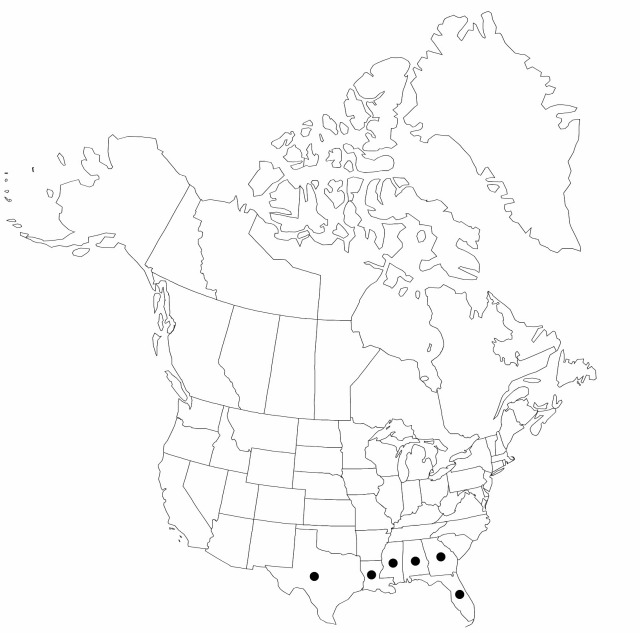Difference between revisions of "Fuirena longa"
Fl. South U.S. ed. 3, 541. 1897.
FNA>Volume Importer |
imported>Volume Importer |
||
| (6 intermediate revisions by 2 users not shown) | |||
| Line 6: | Line 6: | ||
|place=3, 541. 1897 | |place=3, 541. 1897 | ||
|year=1897 | |year=1897 | ||
| + | }} | ||
| + | |special_status={{Treatment/ID/Special_status | ||
| + | |code=F | ||
| + | |label=Illustrated | ||
| + | }}{{Treatment/ID/Special_status | ||
| + | |code=E | ||
| + | |label=Endemic | ||
}} | }} | ||
|basionyms= | |basionyms= | ||
| Line 23: | Line 30: | ||
|elevation=0–100 m | |elevation=0–100 m | ||
|distribution=Ala.;Fla.;Ga.;La.;Miss.;Tex. | |distribution=Ala.;Fla.;Ga.;La.;Miss.;Tex. | ||
| − | |discussion=<p>Fuirena longa is ostensibly a stable hybrid between F. breviseta and F. scirpoidea.</p> | + | |discussion=<p><i>Fuirena longa</i> is ostensibly a stable hybrid between <i>F. breviseta</i> and <i>F. scirpoidea</i>.</p> |
|tables= | |tables= | ||
|references= | |references= | ||
| Line 32: | Line 39: | ||
-->{{#Taxon: | -->{{#Taxon: | ||
name=Fuirena longa | name=Fuirena longa | ||
| − | |||
|authority=Chapman | |authority=Chapman | ||
|rank=species | |rank=species | ||
| Line 46: | Line 52: | ||
|publication title=Fl. South U.S. ed. | |publication title=Fl. South U.S. ed. | ||
|publication year=1897 | |publication year=1897 | ||
| − | |special status= | + | |special status=Illustrated;Endemic |
| − | |source xml=https:// | + | |source xml=https://bitbucket.org/aafc-mbb/fna-data-curation/src/2e0870ddd59836b60bcf96646a41e87ea5a5943a/coarse_grained_fna_xml/V23/V23_46.xml |
|genus=Fuirena | |genus=Fuirena | ||
|species=Fuirena longa | |species=Fuirena longa | ||
Latest revision as of 20:40, 5 November 2020
Herbs perennial, rhizomatous, 20–60 cm, nearly glabrous; rhizomes much branched. Culms tufted or regularly spaced along rhizome, slender, wandlike, frequently hispidulous distally. Leaves: principal blades at mid and distal culm, short-linear, 1.5–5 cm, puberulent distally. Inflorescences terminal, of 1–2 clusters; spikelets 1 or 2–5 per cluster, subtending involucral bract longer than spikelets. Spikelets cylindric-lanceoloid or lance-ovoid, 10 mm, apex acute; fertile scales mostly obovate, 2.5–3.5 mm; mucro erect, 1/2 or more length of scale; median ribs 5–7, 3 convergent to mucro. Flowers: perianth bristles reaching base of perianth blades, retrorsely scabrid; perianth blades oblong-obovate, as long as claws, base flattened, 3-ribbed, apex thickened, narrowly acuminate, sharp; anthers mostly 3, 1.3–1.5 mm. Achenes: body angles pale, wirelike, faces lustrous red-brown or chestnut brown, 1 mm; beak narrow, linear, hispidulous at tip. 2n = 46.
Phenology: Fruiting summer–fall.
Habitat: Brackish and freshwater marsh edges, flatwoods seeps, ditches, moist savanna
Elevation: 0–100 m
Distribution

Ala., Fla., Ga., La., Miss., Tex.
Discussion
Fuirena longa is ostensibly a stable hybrid between F. breviseta and F. scirpoidea.
Selected References
None.
